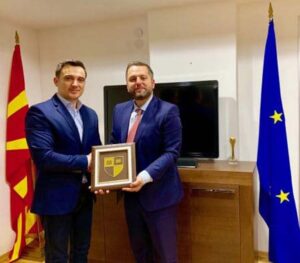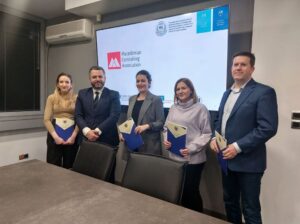Young people are interested in the events on the topic of “Digital formation of education”, organized by the Digital Transformation Council (DTC) within the Heidelberg Institute and the Forum for Educational Change (FECH).
“I am really glad that the Council finds a lot of support, a huge number of exchange of ideas, development of potential and establishment of already concrete cooperations. I think we are already raising the topic of digital transformation on a sound basis. Because digitalization must not be personal or a topic privatized by anyone, but it is a common and inclusive process in which there is and must be a place for everyone. The role of the Digital Transformation Council is to lend a hand to all those who selflessly make efforts and contribute daily to the creation of sustainable digitalization of education, but also effective digital transformation of interest to citizens in all other areas.” – said communicologist Bojan Kordalov, who is President of the Council
The Forum for Educational Change aims to contribute to improving the quality of higher education in the country and to encourage students to contribute to the local and international community through their active participation in the decision-making process, pointed out Blendi Hodai, Executive Director of the Forum for Educational Change.
“FECH is a joint investment of people of good will who joined with precise goals – N. Macedonia to have high quality state education. For us, digitalization is a very important topic, because the 21st century requires us to have a digitalized education system. I fully agree that the process of digital transformation should not be privatized, because every organization and every individual should contribute to the adaptation of this process.” said Hodai during the debate.
A recent survey by the DTC, IDUEP and FECH found that 70% of pupils and students from the Open Balkans countries (Albania, N. Macedonia, Serbia) prefer a classroom learning model or a combined model. To the question: “Is this a signal that young people do not want digital education or something completely different?” answered professor Sinisha Naumoski, who pointed out that digitalization as a term has a very important meaning in the country.
“In my opinion, digitalization is not just the introduction or purchase of a computer, it represents the whole system. I think that it is too early for the process in our country, for such a dynamic introduction of digitalization in education. I stand for the combination of hybrid models because complete digitalization would turn into complete desocialization of young people and students. With quick steps, but slowly, to move forward the process of digitalization of the education system.” said Professor Naumoski.
“The desire should be based on realistic assessments of what can be done at the moment. The coronavirus pandemic has imposed the accelerated process of digitalization on us, both in education and in other areas, but at the same time has brought to the surface important issues such as: media literacy, digital literacy, ethical aspects of digitalization in education, privacy, protection of personal data and cyber security. Special attention should be paid to these issues and the processes should move in parallel.” said Ljubica Pendaroska, personal data protection expert, member of the Digital Transformation Council.
“The education system faces a number of challenges – on the one hand the rapid pace of change in technology has contributed to processes and opportunities where young people have real-time access to a wealth of information, while on the other hand – educational institutions have a slower pace and do not follow the changes and opportunities offered by technologies. Today, most young people are informed through social networks and new communication channels, where the problem lies and the risk that it is not regulated and subjected to misinformation and abuse.” – said Era Aliu, representative of the Forum for Educational Change, when asked: “Is the digital transformation of education a completely positive process?”
The purpose of establishing the Council for Digital Transformation for the Western Balkans at the Heidelberg Institute is to unite the civil and private sectors, as well as the academic community that are active in the field of digitalization. Together, to give concrete support to the efforts for successful and sustainable digital transformation initiated by the public institutions and governments of the Western Balkan countries. They follow the international experiences (German and Western in general) in their successful models of digital transformation and draw positive practices in order to create a successful Macedonian and a model for sustainable digitalization of interest to all citizens of the Western Balkans region.
At the end of this online debate, an invitation was sent to the FECH representatives for their membership in the Council, which was accepted by them. At the same time, the recent signing of a Memorandum of Cooperation between the Digital Transformation Council at the Heidelberg Institute and the Forum for Educational Change was announced.
The full video of the event is available HERE.





